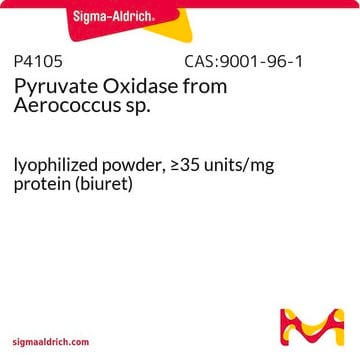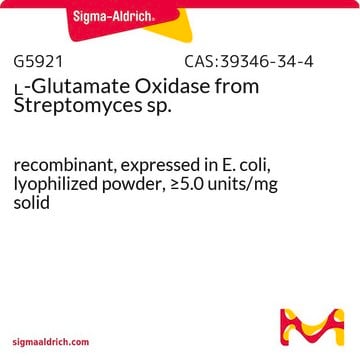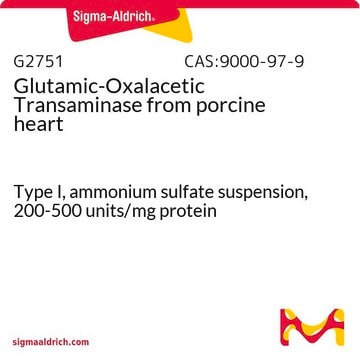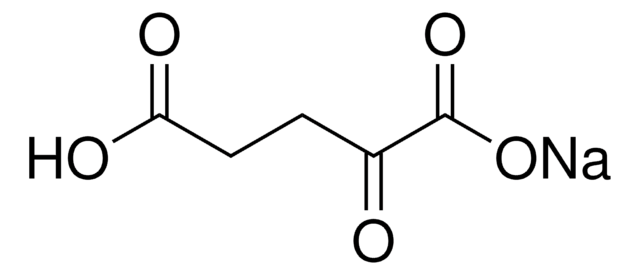P4591
Pyruvate Oxidase from microorganisms
lyophilized powder, ≥1.5 U/mg
Synonym(s):
Pyruvate:oxygen oxidoreductase (phosphorylating)
Sign Into View Organizational & Contract Pricing
All Photos(5)
About This Item
Recommended Products
Application
Pyruvate Oxidase (PoxB) converts pyruvate directly to acetate and CO2. It is used to study pyruvate metabolism. It is used to study aerobic metabolism of bacterium, such as Lactobacillus plantarumand Streptococcus pneumoniae. Pyruvate Oxidase is used for enzymatic determination of pyruvate, GOT, and GPT in clinical analysis.
Pyruvate Oxidase from microorganisms has been used in the Amplex Red-based fluorescence assay for pyruvate. It has also been used in developing near real-time continuous detection system for pyruvate.
Biochem/physiol Actions
Pyruvate Oxidase consists of four subunits with identical molecular weights. PoxB reacts with certain aldehydes and phosphate can be replaced by arsenate. Oxygen as well as several artificial compounds can function as electron acceptors. Pyruvate Oxidase is activated by phospholipids as well as monomeric and micellar amphiphiles.
Pyruvate Oxidase oxidises pyruvate to form acetate, hydrogen peroxide and carbondioxide. Pyruvate oxidase requires flavin adenine dinucleotide (FAD), thiamine pyrophosphate (TPP) and magnesium as cofactors for its catalytic activity. Pyruvate oxidase is activated by the cofactor thiamine.
Physical properties
Isoelectric point : 4.3
Michaelis constant : 3.4 X 10-4M (Pyruvate)
Inhibitors : Fe++,Zn++,Cu++,Ag+,Hg++
Optimum pH : 5.7
Optimum temperature : 65oC
pH Stability : pH 5.7 - 6.5 (25oC, 20hr)
Thermal stability : below 45oC (pH 6.0, 15min)
Michaelis constant : 3.4 X 10-4M (Pyruvate)
Inhibitors : Fe++,Zn++,Cu++,Ag+,Hg++
Optimum pH : 5.7
Optimum temperature : 65oC
pH Stability : pH 5.7 - 6.5 (25oC, 20hr)
Thermal stability : below 45oC (pH 6.0, 15min)
Unit Definition
One unit will produce 1.0 μmole of H2O2 per min during the conversion of pyruvate and phosphate to acetylphosphate and CO2 at pH 5.7 at 37 °C.
Physical form
Lyophilized powder containing FAD and sugar as stabilizer
Signal Word
Danger
Hazard Statements
Precautionary Statements
Hazard Classifications
Resp. Sens. 1
Storage Class Code
11 - Combustible Solids
WGK
WGK 3
Flash Point(F)
Not applicable
Flash Point(C)
Not applicable
Personal Protective Equipment
dust mask type N95 (US), Eyeshields, Gloves
Certificates of Analysis (COA)
Search for Certificates of Analysis (COA) by entering the products Lot/Batch Number. Lot and Batch Numbers can be found on a product’s label following the words ‘Lot’ or ‘Batch’.
Already Own This Product?
Find documentation for the products that you have recently purchased in the Document Library.
Customers Also Viewed
Multiplexed and fully automated detection of metabolic biomarkers using microdialysis probe
Das C, et al.
Sensors and Actuators B, Chemical, 238, 633-640 (2017)
Masoom Yasinzai
The International journal of biological markers, 24(2), 107-111 (2009-07-28)
Cancer patients are found to have elevated serum levels of lipid-associated sialic acid (LASA). LASA measurement provides a valuable test for the diagnosis of human cancer. The currently used measurement methods are tedious and nonselective. Here we report a method
A novel biosensor based on activation effect of thiamine on the activity of pyruvate oxidase
Akyilmaz E and Yorganci E
Biosensors And Bioelectronics, 23(12), 1874-1877 (2008)
Piotr Neumann et al.
Proceedings of the National Academy of Sciences of the United States of America, 105(45), 17390-17395 (2008-11-08)
The thiamin- and flavin-dependent peripheral membrane enzyme pyruvate oxidase from E. coli catalyzes the oxidative decarboxylation of the central metabolite pyruvate to CO(2) and acetate. Concomitant reduction of the enzyme-bound flavin triggers membrane binding of the C terminus and shuttling
Lanyan Zheng et al.
Journal of bacteriology, 193(2), 516-526 (2010-11-03)
Streptococcus sanguinis is a commensal oral bacterium producing hydrogen peroxide (H₂O₂) that is dependent on pyruvate oxidase (Spx) activity. In addition to its well-known role in bacterial antagonism during interspecies competition, H₂O₂ causes cell death in about 10% of the
Protocols
Protocol for Assay Procedure for Pyruvate Oxidase Bacterial
Our team of scientists has experience in all areas of research including Life Science, Material Science, Chemical Synthesis, Chromatography, Analytical and many others.
Contact Technical Service














